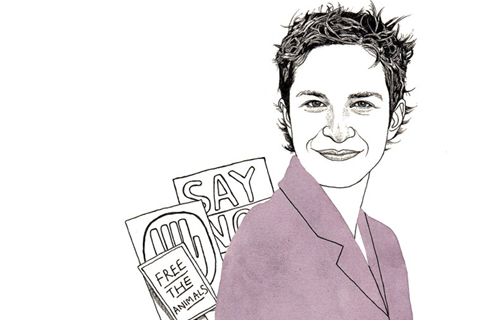On Professor Naisargi Dave’s office door is a sticker promoting veganism, and a postcard denouncing a coat company for killing coyotes for fur trim. The writings of Gandhi and Eating Animals by Jonathan Safran Foer sit on her bookshelf. All signs point to an activist, but the anthropology professor says she isn’t “wired to be one.” Instead, she mulls over the questions: What is the nature of activism, and what makes someone an activist?
In her first book, Queer Activism in India: A Story in the Anthropology of Ethics (2012), Dave traces the lesbian rights movement in India from 1987 to 2008. While Dave’s research centres on India, her work is also important in helping North Americans understand the nature of their own activism. The book tackles universal questions, such as how activism emerges and how activists’ practices and ethics shift when they are negotiating with social institutions, including ones that they themselves have created.
Dave is currently in India researching a book on animal activism, for which she has won a Chancellor Jackman Research fellowship. With this new work, she is exploring animal-human relationships from a post-humanistic standpoint (a perspective that does not put people at the centre of the universe) and she wants readers to imagine the world in a new way: one that does not make a division between those who “matter” (certain humans and companion animals) and those who don’t.
One of her important findings is that many people who live on the streets of India hold a post-humanistic perspective: they have strong relationships with animals on the streets, take care of them and value their lives alongside their own.
This throws cold water on a prevalent belief in India that the rights of animals concern only the upper class or Westerners. “I think India’s upper class and Westerners see it as a class-sensitive move to say that we should care about humans and not animals – why care for animals in a place where people are suffering? – which is actually not necessarily the value system of the people we think we’re speaking for. That’s all about our own elitist, humanistic perspective that I think is condescending, because it assumes that everybody has the same value system.”
Dave – who grew up in Atlanta, Georgia (her parents are from Ahmedabad, India) – teaches courses ranging from the anthropology of South Asia, to gender and sexuality, to posthumanism, and aims to make her classes very dialogue driven. She points to an anthropology class of 80 students modelled on the graduate seminar, which led to a vibrant discussion every day. “For me, it is just about having conversations, and the most important thing is always learning how to think critically, creatively and imaginatively about the world.”






